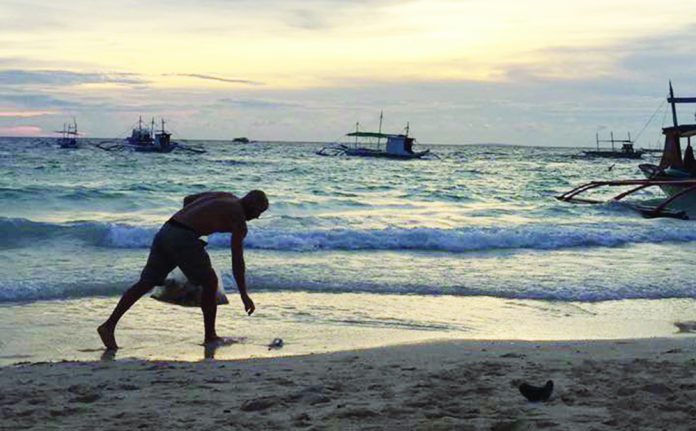
BORACAY – Environment secretary Roy Cimatu is “seriously considering” a ban on single-use plastics in this closed island resort.
The famed beach destination generates an estimated 90 to 115 tons of garbage a day, but only 30 to 40 tons are hauled out to mainland Malay, Aklan, according to the Department of Environment and Natural Resources (DENR).
A large portion of Boracay’s trash is composed of single-use plastic products like grocery bags, toothbrush, bottled water, sachets of shampoo and condiments, and soap wrappers, among others.
Cimatu said prohibiting single-use plastics would not only help solve the island’s solid waste problem but also address the plastic pollution that threatens its marine environment.
“Plastic, particularly those for single-use packaging, has greatly contributed to the degradation of the environment,” Cimatu stressed.“Plastic pollution continues to poison our oceans and injure marine life. When not properly disposed, they clog waterways and cause flooding.”
Hotels in Boracay will be encouraged to use dispensers for their liquid soap, shampoo and conditioner while stores will be asked to sell condiments like soy sauce, vinegar and cooking oil through refilling stations.
“Let us go back to basics. We used to bring a glass bottle to the sari-sari store when we buy cooking oil and vinegar. Let’s do the same now,” Cimatu said.
National Solid Waste Management Commission executive director Eligio Ildefonso supports a ban on single-use plastic items not only in Boracay, but all over the country.
“Single-use plastic is what its name says, for single-use,” Ildefonso said. “It cannot be recycled and reused; people have no motivation to recover it. It has no further use so it should be discouraged.”
Ildefonso encourages the use of eco-bags when buying wet and dry goods. “Eco-bags can be reused. You can wash them. They do not contribute to solid waste,” he explained.
Boracay was closed off to tourists beginning April 26 to give way to a six-month rehabilitation.
Last year, Cimatu ordered the removal of at least 20,000 cubic meters of residual waste from Boracay’s materials recovery facility (MRF) in Barangay Manoc-manoc, which was used as an open dumpsite.
The huge volume of solid waste caused a longer turnaround time for garbage hauling trucks, thus resulting in accumulation of garbage and delay in its transfer to the sanitary landfill in mainland Malay.
Republic Act 9003, or the Ecological Solid Waste Management Act of 2000, mandates local government units to have a comprehensive solid waste management plan and establish an MRF in each barangay to efficiently receive, sort, process and store compostable and recyclable materials.
The law strictly prohibits the establishment and operation of open dumpsites. (With DENR/PN)




